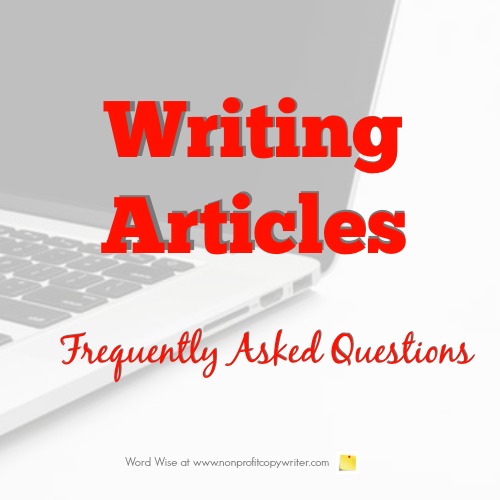
Writing Articles: FAQs (Frequently Asked Questions)
Award-winning writer Kathy Widenhouse has helped hundreds of nonprofits and writers produce successful content and has gained 600K+ views for her writing tutorials. She is the author of 9 books. See more of Kathy’s content here.
Updated 8.6.24
If you’re venturing into writing articles to produce content or to get started as a writer, here are some basics to get going.
Q: What is an article?
An article is a piece of writing that gives information. Its purpose is to explain or inform.
Q. Why should I write articles?
Information is currency. People find information they need: how to do things, where to buy things, and how to solve problems. Why shouldn’t you be the person to answer their questions?
When you write an article, you become a source of information. If you write helpful, credible, well-constructed articles, you become a trusted source of information. When you write several articles, particularly about a particular topic, you become a go-to source for information about that topic.
Q. Where are articles printed?
In newspapers, magazines (online and in print), websites, newsletters,
business or trade publications, technical journals, and in scientific,
academic, or scholarly publications.
Q. How are articles different from blog posts, editorials, essays, or copywriting?
Articles focus on telling you about a particular topic, reporting on an event or research, explaining why or how something works, or giving you how-to instructions. Blog posts, editorials, essays, and copywriting are forms of persuasive writing. They inject opinion, backed up with reasoning and arguments, to convince the reader to take on a particularly point of view. (More differences here.)
Q. What kinds of articles are most common?
Interviews, how-to pieces, news, investigative reports, travel pieces, technical articles, profiles, academic reports, case studies, and new product introductions. Here is a list of 29 types of articles you can write.
Q. How long is an article?
That depends on where it’s published and who reads it. Publishers specify article word count in their writer’s guidelines. Articles 500 words or less are considered “shorts.” Average feature article length is 1000-3000 words. Academic and scholarly articles, of course, are longer. Longer articles typically include more research and explanation.
Q. I’ve heard that article writing focuses on research. How much?
Don’t confuse “research” with “information.” A good article is grounded in facts, which can include statistics, quotes, definitions, examples, anecdotes, references, tools, resources, or products. You accumulate “information” when you “research.” Keep good records of your research and you’ll find that you have plenty of information to write an article – or more than one.
Q. Can a writer earn a living writing articles?
Sure. As in any other business, article writing can become a specialized skill. Many freelance writers earn a decent living writing for publications, especially when they accumulate a lot of information about a particular topic and write about it often.
More Article Writing Tips
Learn To Write Content When You Learn To Write an Article ...
How to Write An Article: Get Started With These 12 Steps ...
How to Narrow Your Article Main Idea ...
Want Steady Traffic? Write 3 Different Types of Articles that Deliver ...
3 Article Formats You Can Learn to Write Easily ...
How to Write an Article Introduction Faster ...
How to Test an Article Idea ...
12 Tips for Successful Interviewing ...
How to Choose an Article Topic...
What Is a Feature Article? Think News Story on Steroids ...
Choose a Story Angle Using These 3 Tips ...
6 Types of Articles New Freelancers Can Get Paid to Write ...
Write an Article or Write a Book? Here’s How to Decide ...
Article Writing Tips: News Story vs Feature Story – What’s the Difference?
Top Article Writing Tip: the One-Point Rule ...
Include these 5 different types of articles in your newsletter ...
29 Kinds of Articles You Can Write ...
How to find the main idea of your article before you write ...
How to Write a How To Article that gets read from start to finish ...
How to Write an Outline: Article Writing Tips ...
How to Write Query Letters: A Quick Tutorial ...
How to Write an Introduction (or Lead, Lede, Hook) ...
Tips for Writing a Hook for Your Article ...
How to write a conclusion: 3 tips ...
6 Tips for Writing Powerful Endings ...
The Inverted Pyramid: Article Writing Format for Online Content, Too ...
How to Write a Sidebar that Adds Value to an Article ...
How to Make Sure Your Articles Get Read ...
Writing Blogs vs. Writing Articles: Is There a Difference?
What's a Listicle and How Do I Write One?
Writing Articles Tips on our Pinterest board ...
Return from Writing Articles FAQs to Nonprofit Copywriter home
As an Amazon Associate I earn from qualifying purchases.
Search This Site
Share This Page

Named to 2022 Writer's Digest list
BEST GENRE/NICHE WRITING WEBSITE


Stop Wasting Time!

Grab your exclusive FREE guide, "5 Simple Writing Tips You Can Put to Use in 10 Minutes or Less"









